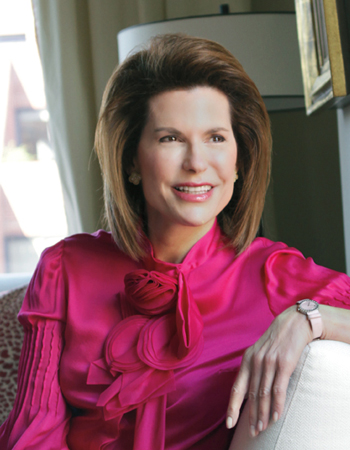After a three-year battle with breast cancer, Susan G. Komen lost her life to the disease in 1980. Two years later, her sister, Nancy G. Brinker, founded Susan G. Komen for the Cure in honor of her beloved sibling. Since then, the organization has raised more than $2 billion in scientific research and community outreach projects to help in finding the cure to the most common women’s cancer (one that Brinker is a survivor of herself) as well as put the spotlight on this once little-discussed cancer.

AFM: Tell us about the early days of Susan G. Komen for the Cure.
NGB: They were very exciting but frustrating at the same time. Breast cancer wasn’t discussed in polite company, so I had difficulty just getting people to talk about breast cancer or to print in the newspaper that one of our events would benefit breast cancer; I had to say ‘women’s cancers.’ Fortunately, we had this little group of volunteers who, like me, wouldn’t take no for an answer. We had a lot of doors closed in our face, but we were hopeful and perhaps stubborn enough to keep going. I’m immensely proud of those women and our supporters who just wouldn’t give up. They’ve helped us build an organization that is finding treatments and helping to lower mortality rates from this disease.
AFM: What has the organization’s crowning achievement been?
NGB: I’m so proud of everything that we’ve been able to accomplish. ...I feel the most pride, though, when a woman walks up to me at a speech or an event and tells me her story—how she caught her cancer early because of our education and screening programs, how the community and her family supported her, and how the treatments that we helped develop have allowed her to be there for the people she cares about.
AFM: What advice do you have for women who are newly diagnosed?
NGB: First, take a very deep breath and understand that there are things that you can do. You can be proactive and that starts by learning all that you can about your diagnosis and getting support through your journey. We have very comprehensive information on our Web site, www.komen.org. We also have a global community of people online that encourages and supports you. Our Komen Affiliates in Phoenix and Tucson are here to help the women in Arizona who need us, so please take advantage of the resources that we offer globally and close to home. Very, very important: don’t be afraid to ask for help. Women tend to think of others’ needs before we take care of ourselves. We think we need to be strong for everyone we love. Of course, we do, but I can’t emphasize enough that this is a time to be sure that you are taking care of yourself.
AFM: What are your future goals for Susan G. Komen for the Cure?
NGB: We set a goal of ending breast cancer forever, which is a very ambitious goal but one that I know is achievable—look how far we’ve come in just one generation. Going forward, we’ve set aggressive goals for our research program, funding projects that could lead to vaccines, scientifically sound prevention strategies, and more effective and personalized treatments for aggressive and metastatic disease. By that, I mean treatments that will cure women or, at the very least, allow people with very advanced or aggressive disease to live for a very long time with a good quality of life. We will be announcing strategies this fall to bring effective and innovative approaches to breast cancer screening and treatment to low-resource
countries, and we’re enhancing our existing programs to reach out to diverse women, whose outcomes from breast cancer today are often worse than those of their Caucasian counterparts.
AFM: What do you think your sister would think of your achievements?
NGB: Suzy was my best friend and my most honest critic. I think she would say, ‘Well, that’s great, Nan, but what’s next? You’re not done yet.’
